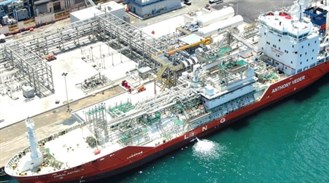Asia prices inch up ahead of possible EU ban on Russian oil
(Reuters) - Asian spot LNG prices inched up this week as market players fear prices might skyrocket if the European Union imposes a ban on Russian oil and Moscow reacts by halting gas supplies to the continent.

The average LNG price for June delivery into north-east Asia was estimated at $23.90 per MMBtu, up $0.40 from the previous week, industry sources said.
European gas prices have risen recently amid ongoing concerns over possible cuts to supply from Russia, which provides around 40% of the bloc’s gas.
The European Commission will discuss on Friday a tweaked proposal to embargo Russian oil. The proposal would include a three-month transition before the introduction of a ban on shipping services to transport Russian oil, instead of the initial one month.
Russian President Vladimir Putin put the West on notice on Tuesday after he signed a broad decree which forbade the export of products and raw materials to people and entities on a sanctions list that he instructed the government to draw up within 10 days.
"The proposed EU ban for Russian oil is increasing market tensions about possible future gas supply disruptions either triggered by a Russian counter move, or a EU ban on natural gas later in the year," said Hans van Cleef, senior energy economist at ABN Amro.
A stable flow of LNG into Europe and restoring European gas storage have helped ease some concerns, according to Jamie Maddock, equity research analyst at Quilter Cheviot.
"European gas prices have thankfully stopped their upward climb but it’s taken a lot. However, with the EU coming close to reaching a deal on Russian oil import sanctions, there is a high potential for a reversal of the willingness to meet Russia’s Rouble payment demands leaving the market and prices precariously balanced," he said.
Rystad Energy said in a recent report that European LNG imports hit a five-year monthly high in April as supply tightness in the continent, with France, Spain and the UK topping the importers list.
However, most European countries will struggle to replace a sudden drop in supply if it happens.
LNG inflow in UK and Spain are creating supply bottlenecks as the infrastructure is not connected to the rest of Europe, according to Van Cleef.
Spark commodities said that forward curves continue to point to U.S. cargos being sent to Europe rather than Asia for the next 12 months.
In Asia, there is some buying interest from south Asian markets amid softer spot prices, while demand for spot cargoes is expected to remain muted in China as ongoing Covid-19 related lockdown measures have now been extended to the capital Beijing, Refinitive analysts said.
(Reporting by Marwa Rashad; Editing by Nina Chestney)

- RWE strengthens partnerships with ADNOC and Masdar to enhance energy security in Germany and Europe
- TotalEnergies and Mozambique announce the full restart of the $20-B Mozambique LNG project
- Venture Global wins LNG arbitration case brought by Spain's Repsol
- KBR awarded FEED for Coastal Bend LNG project
- Norway pipeline gas export down 2.3% in 2025, seen steady this year



Comments